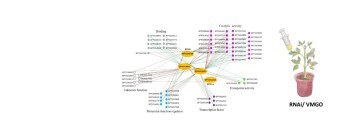A Novel Plant Sesquiterpene Lactone Derivative, DETD-35, Suppresses BRAFV600E Mutant Melanoma Growth and Overcomes Acquired Vemurafenib Resistance in Mice
Acquired resistance to vemurafenib, a chemotherapeutic drug that specifically targets BRAFV600E mutant melanoma, is developed frequently through reactivation of RAF/MEK/ERK signaling or bypass mechanisms. Recent combination therapy such as MEK inhibitor combined with vemurafenib shows improvement in major clinical end points but percentage of patients with adverse toxic events are higher compared to vemurafenib monotherapy and most patients relapse ultimately. It is therefore an urgent need to develop new anti-melanoma drug and/or adjuvant agent for vemurafenib therapy. In this study, we created a novel semi-organically modified derivative DETD-35 from deoxyelephantopin (DET), a plant sesquiterpene lactone demonstrated as an anti-inflammatory and anti-mammary tumor agent in our laboratory previously. DETD-35 suppressed both parental human BRAFV600E mutant melanoma (A375) and vemurafenib resistance melanoma (A375-R) cell proliferation in vitro with superior activities to parental compound DET and no cytotoxicity to normal melanocyte. DETD-35 inhibited BRAFV600E mutant melanoma growth as effective as FDA approval drug vemurafenib and overcame both intrinsic and acquired vemurafenib resistance in mouse xenograft. Notably, the combination of DETD-35 and vemurafenib exhibited synergism and showed the most significant effects in both in vitro and xenograft mouse models compared to the monotherapy. Mechanistic studies revealed DETD-35 triggered ROSinduced apoptosis cell death in both A375 and A375-R melanoma cells and overcame acquired vemurafenib resistance through inhibition of the MEK-ERK, Akt, and STAT3 signaling pathways. Overall, our data suggests the great therapeutic or adjuvant potential of DETD-35 in management of melanoma patients with BRAFV600E mutation. The results are published in top rank journal “Molecular Cancer Therapeutics” in “Oncology” category and was to be selected as the “High lights” of the issue. One ROC patent issued and PCT patent pending.
Lie-Fen Shyur
Distinguished Research Fellow
(02) 2787-2102
jaclyn@gate.sinica.edu.tw
A731, Agricultural Technology Building
Lab.
A728, Agricultural Technology Building
Tel: (02) 2787-2100
- 07/2018- to date Distinguished Research Fellow, Agricultural Biotechnology Research Center, Academia Sinica
- 05/2019-08/2019 Visiting Scholar of UC Davis, USA
- 03/2008- 8/2016 Vice Director, Agricultural Biotechnology Research Center, Academia Sinica
- 2008-2018 Research Fellow, Agricultural Biotechnology Research Center, Academia Sinica
- 2008-2014 Coordinator of Molecular and Biological Agricultural Sciences program of Taiwan International Graduate Program (TIGP-MBAS), Academia Sinica
- 2003-2008 Associate Research Fellow, Agricultural Biotechnology Research Center, Academia Sinica
- 1998-2003 Assistant Research Fellow, Institute of BioAgricultural Sciences, Academia Sinica
- 1994-1997 Postdoctoral Research Fellow, Department of Biochemistry and Biophysics, Iowa State University, USA
- 1991-1992 Postdoctoral Research Fellow, Department of Agricultural Chemistry, National Taiwan University
- 1990-1991 Postdoctoral Research Fellow, Department of Biochemistry, Chang Gung University
SPECIAL ACHIEVEMENT
- Received US FDA approval for Zhaohe Cao (???)-based botanical drug for an Investigational New Drug (IND) for cancer therapy (2017).

